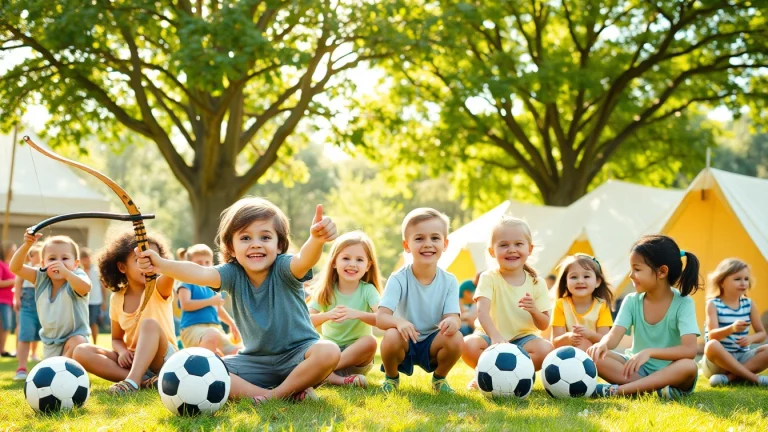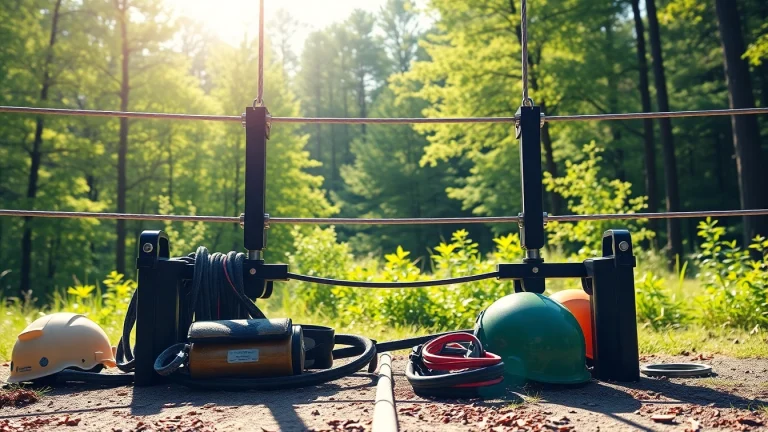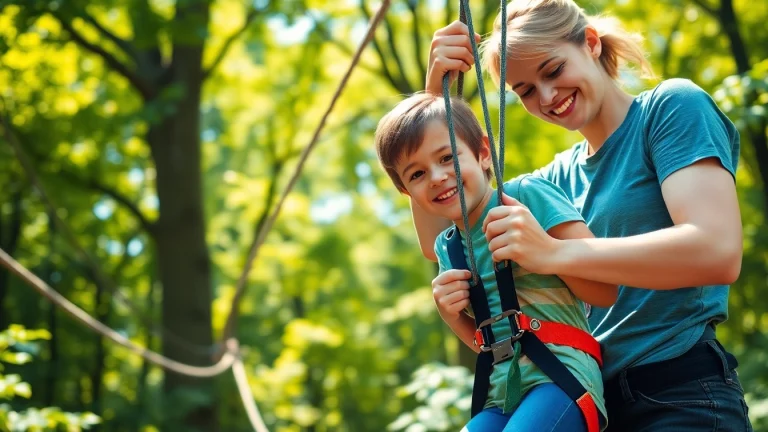
Engaging Experiences and Activities at Holiday Camps for All Ages
Introduction to Holiday Camps
As the sun shines brightly and school breaks sweep in, many families start planning for an enriching experience for their children. This is where holiday camps come into play. These camps offer a diverse range of activities that not only entertain but also educate children, providing them with opportunities to develop critical life skills outside the classroom.
What Are Holiday Camps?
Holiday camps are organized programs that offer children a variety of activities during school breaks, including summer, winter, or spring holidays. They can range from day camps where children return home in the evenings, to residential camps that provide overnight accommodations. Typically designed for children of various ages, these camps focus on fostering social interactions, personal development, and outdoor skills.
Benefits of Attending Holiday Camps
Attending holiday camps comes with numerous benefits. Firstly, they provide a structured environment for children to engage in various activities that promote physical and emotional well-being. This allows kids to develop new interests, hone existing skills, and build lifelong friendships. Furthermore, holiday camps often emphasize teamwork, problem-solving, and self-confidence through collaborative efforts in various activities.
Types of Holiday Camps Available
Holiday camps can be classified into several types based on their focus and structure. Here are some common categories:
- Sports Camps: These camps focus on athletic skill development and offer coaching in various sports while also encouraging teamwork and sportsmanship.
- Arts Camps: For kids interested in creative expression, arts camps concentrate on theater, music, painting, and other forms of artistic exploration.
- Adventure Camps: These camps provide exhilarating experiences such as hiking, rock climbing, and outdoor survival skills, often immersing children in nature.
- Academic Camps: Designed to enhance learning and academic performance, these camps make subjects like science, math, and technology engaging through interactive sessions.
- Special Interest Camps: These are tailored to specific hobbies or themes such as coding, cooking, or environmental stewardship, catering to niche interests.
Choosing the Right Holiday Camp
Factors to Consider When Selecting Holiday Camps
When choosing a holiday camp for your child, several factors come into play. First, consider the age and developmental stage of your child to find a suitable camp that caters to their specific needs. Another critical aspect is the camp’s location, as accessibility can impact your child’s experience. Additionally, inquire about the qualifications of the camp staff, the child-to-counselor ratio, and the overall reputation of the camp. Camp reviews by parents can also serve as valuable indicators of the quality of the program.
How to Match Your Child’s Interests with Holiday Camps
Aligning your child’s interests with a holiday camp is fundamental to ensuring they have a fulfilling experience. Engage your child in discussions about their hobbies and interests—be it sports, arts, or science— and look for camps that specialize in those areas. Observing your child’s past activities can also provide insights. If they enjoyed a pottery class, for instance, an arts camp might be a great match. Supporting your child’s passion can lead to greater enthusiasm and satisfaction during their camp experience.
Evaluating Camp Locations and Facilities
The facilities and setting of a holiday camp can significantly influence your child’s experience. Evaluate the camp’s location—both in terms of accessibility from your home and the environment. A camp situated in a natural setting, conducive to outdoor activities, may provide a more adventurous experience. Inspect the facilities available, from sleeping arrangements and dining options to sports equipment and safety measures. A well-maintained environment with adequate amenities can enhance your child’s comfort and enjoyment.
Activities Offered at Holiday Camps
Popular Outdoor Activities at Holiday Camps
Outdoor activities are a staple of holiday camps, leveraging the great outdoors to promote fun, adventure, and physical fitness. Some popular options include:
- Swimming: Most camps include swimming activities, providing a refreshing way to learn water safety and engage in exercise.
- Hiking: Outdoor exploration through local trails helps children appreciate nature while improving their physical fitness.
- Team Sports: Camps often organize games such as soccer, basketball, and capture the flag, fostering teamwork and sportsmanship.
- Nature Scavenger Hunts: These activities encourage kids to explore their surroundings, enhancing their observational skills and knowledge about the environment.
Creative Workshops and Learning Experiences
Beyond physical activities, holiday camps encourage creativity through workshops and learning experiences. These might include:
- Arts and Crafts: Camps often feature sessions where children create crafts from various materials, enhancing their fine motor skills.
- Music Workshops: From learning an instrument to songwriting, musical activities allow children to express themselves creatively.
- Cooking Classes: Camps may offer cooking sessions, providing practical skills while having fun preparing meals and snacks.
- STEM Activities: Interactive sessions on topics like robotics, coding, and science experiments foster inquisitiveness and critical thinking.
Sports and Team-Building Exercises at Holiday Camps
Sports and team-building are integral to holiday camps, creating opportunities for children to bond while developing skills. Organized team games not only promote physical fitness but also teach cooperation, communication, and leadership. Camps might introduce friendly competitions, where children learn to win graciously and accept losses with equanimity.
Safety and Well-being at Holiday Camps
Guidelines for Ensuring Safety at Holiday Camps
Safety is paramount at holiday camps. Ensure the camp has established protocols for health and safety, including trained staff in first aid and emergency response. Camps should routinely conduct safety drills and follow child protection policies. Familiarize yourself with the camp’s safety measures, ensuring they align with your expectations for your child’s protection.
Health Protocols and Emergency Procedures
Consider the camp’s approach to health and wellness; this could include measures for dealing with allergies, managing medications, and addressing health emergencies. Inquire about their protocols for any medical situations, such as injuries or sudden illnesses. A camp that communicates these procedures clearly demonstrates a commitment to safeguarding your child’s well-being.
Parental Involvement and Communication
Maintaining clear channels of communication between camp staff and parents can enhance the overall experience for everyone involved. Camps should facilitate regular updates on activities, health concerns, and any emergencies. Additionally, many camps offer opportunities for parental involvement, which can foster a community feel while ensuring peace of mind for parents.
Preparing for a Memorable Camp Experience
Packing Essentials for Holiday Camps
Packing the right essentials can significantly influence your child’s camp experience. Create a checklist to ensure they have everything they need, such as clothing appropriate for various activities, personal hygiene items, and comfort items like a favorite stuffed toy. Additionally, packing a reusable water bottle encourages hydration during active days and fosters good habits.
Setting Expectations with Your Child Before Camp
Before attending holiday camps, it’s essential to have discussions with your child about what to expect. Talk about the activities they will partake in and encourage them to embrace new experiences. Discuss any nervousness they might feel and reassure them about support from camp staff. Setting healthy expectations can help adjust their mindset, ensuring an overall positive experience.
Follow-Up Activities After Holiday Camps
After returning from holiday camps, engaging in follow-up activities can prolong the benefits of the experience. Encourage your child to share their favorite moments and new skills they’ve acquired. This practice fosters good communication and allows for reflection. Activities such as creating a scrapbook of their camp journey or organizing a mini talent show to display new skills can carry the joy of camp into their everyday life.


